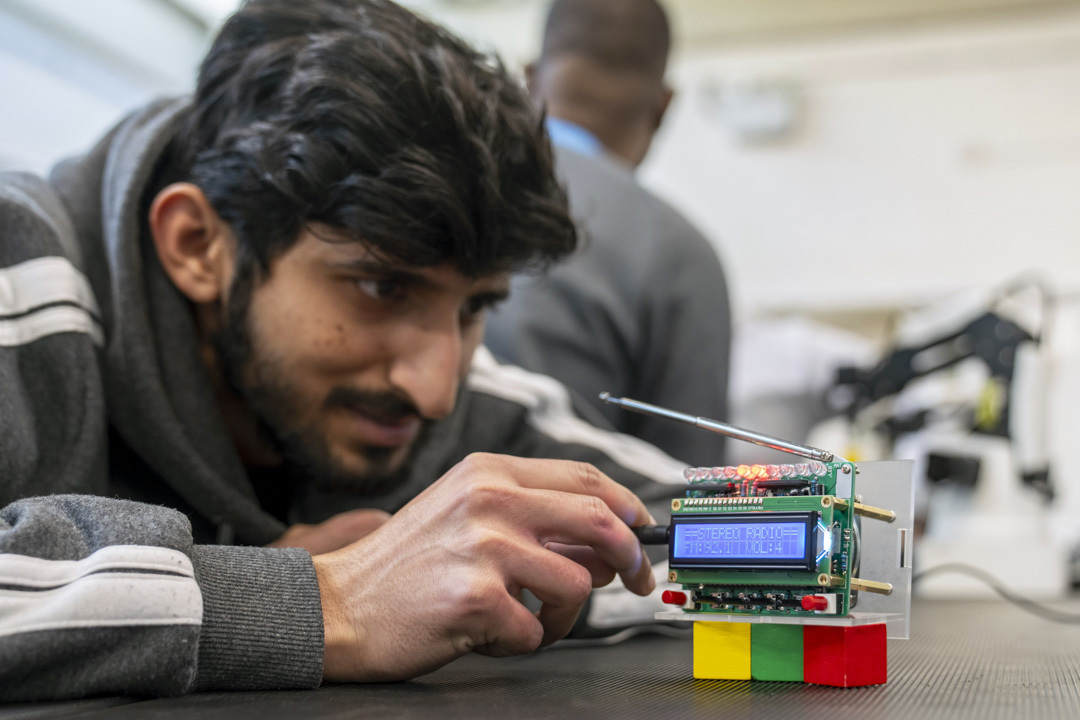
Our Electrical Engineering students show us how the PCB Engraver works…👀
Power the future of renewable energy, smart systems, and sustainable innovation.
This HND Electrical Engineering at Glasgow Kelvin College gives you the advanced knowledge, technical ability, and practical experience needed to work in one of Scotland’s most dynamic and future-focused industries.
You’ll explore how energy is generated, transmitted, and controlled—from traditional electrical systems to cutting-edge renewable technologies. The course blends analytical theory with hands-on lab work, developing your ability to design, maintain, and manage complex electrical systems.
Year 1 allows you to achieve an HNC Electrical Engineering, while Year 2 builds toward your full HND qualification through advanced projects and applied learning. You’ll also complete an individual engineering project, giving you the chance to design, construct, and innovate around a real-world brief.
This course is ideal if you:
You’ll develop both practical and theoretical skills to work confidently across the electrical engineering industry. Your learning includes:
You’ll gain real-world experience through practical lab sessions, project design, and collaboration with industry professionals.
Our Electrical Engineering students show us how the PCB Engraver works…👀
You can apply through several routes:
✅ At least one Higher at grade C or above (Mathematics or Physics preferred)
✅ One Technical Higher (such as Computing Science or Design and Manufacture) at grade C and National 5 Maths at grade C or above OR
✅ NQ Level 6 Mechanical & Electrical Engineering or NC Level 5 Electrical/Electronic Engineering (with suitable maths units) OR
✅ Foundation Apprenticeship in Engineering OR
✅ HNC Electrical Engineering (for direct entry into Year 2) OR
✅ Relevant industrial experience or qualifications (e.g., SVQs – considered individually)
Applicants without formal qualifications are welcome and may be invited to demonstrate their suitability.
We strongly encourage female applicants pursuing careers in engineering.
ℹ️ For this course, if English is not your first language
Graduates can progress into diverse roles within the expanding energy and technology sectors, including:
⚡ Electrical Design Engineer
🔋 Renewable Energy Engineer
🛠️ Electrical Maintenance Technician
💡 Power Systems Engineer
📈 Project Engineer or Engineering Consultant
The qualification also supports registration with the IET and Engineering Council for Engineering Technician (EngTech) status.
An HND in Electrical Engineering opens pathways to:
This course gives you both the academic foundation and the hands-on experience to thrive in an evolving, sustainable energy world.
Hi, my name is Shedden. I'm currently undertaking the HND Electrical Engineering course at Glasgow Kelvin.
I'll show you how the PCB engraver here works. Here we have the finished result.
After cutting from the PCB engraver, we take one of these boards and we can put components on it, as shown here.